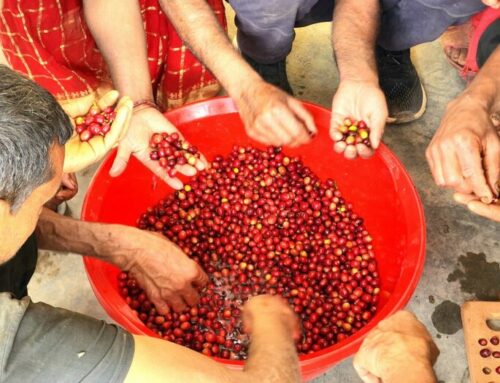May 6, 2019 by Krishana Prasain, The Kathmandu Post
The Prime Minister Agriculture Modernisation Project has started ground work for coffee plantations in five districts that have been identified as a super zone for the agro product, targeting to boost the production of domestic coffee at a time where local production is negligible compared to the soaring demand.
This fiscal year, the government has identified Palpa, Arghakhachi, Gulmi, Syangja and Pyuthan districts for coffee production. Uma Nath Bhandari, senior agricultural officer of the project, said they have formed 27 clusters in 150 wards of these districts to take forth the coffee plantations.
According to Bhandari, Palpa is divided in four clusters, Syangja has 13 clusters and Gulmi is divided in 10 clusters for the purpose. Similarly, two clusters are formed in Arghakhachi and one such group has been made in Pyuthan. Each of the clusters covers an area of 150 ropanies of land. “The project has started work on developing nursery, producing sapling and plantation of coffee plants in these segments,” said Bhandari.
Bhandari said the pilot of the project will last for the next three years during which the plant will yield its output. “Depending on the success, the government will decide to expand the commercial production of coffee in other potential areas.”
According to the National Tea and Coffee Development Board, the country earned Rs65.89 million by exporting 163 tonnes of roasted coffee beans while it spent Rs93.72 million importing 84 tonnes of instant coffee in the last fiscal year. Nepal produces an average of 513 tonnes of coffee annually. Out of this, 40 percent of the product is exported to Germany, the US, Australia, Korea and a number of countries in Europe while the rest is consumed domestically.
The board’s record shows that the demand for domestic coffee stands at over 7,000 tonne annually. Citing the huge potential, the government has planned to improve productivity and the quality through the project, according to Bhandari.
The government has endorsed several policies to facilitate Nepali coffee production. Coffee policy, trade policy, coffee export strategy and Agriculture Development Strategy, among others, have considered production of Nepali coffee in high priority. Likewise, the government authority has also enforced the standards of organic coffee to promote the chemical free agricultural product.
Nepal produces and exports Arabica coffee which is typically grown at a height of 1,000 to 2,000 metres. Coffee is grown in 42 districts in Nepal. Gulmi, Arghakhanchi, Pyuthan, Palpa and Syangja are the largest coffee producers. In addition, coffee plantation is expanding as commercial farming in 21 districts of mid-hill areas of central and western region.
According to the board, the coffee farming is being done across 2,900 hectors of land in contrast to 1.19 million hectares of high potential land area of the country. Lack of manpower, absence of research and implementation of traditional technology are the underlying problems for low yield of the farm product.
http://kathmandupost.ekantipur.com/news/2019-05-06/ground-work-begins-for-coffee-super-zone-in-five-districts.html
Published: 06-05-2019 09:06







Leave A Comment